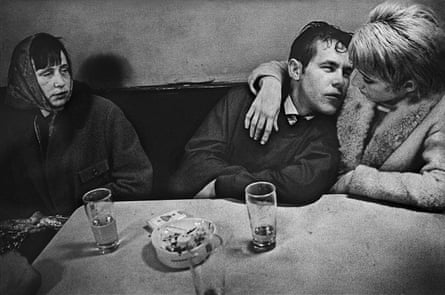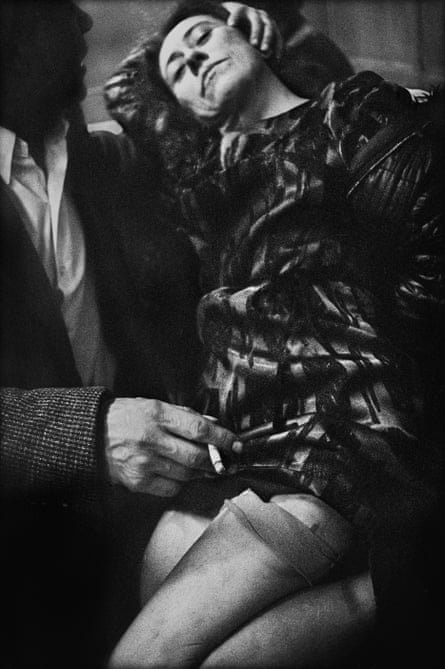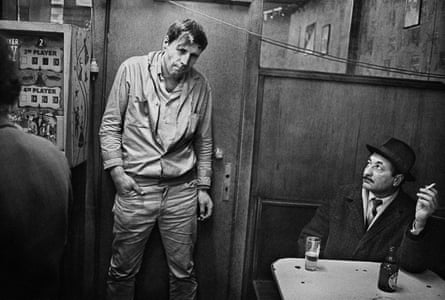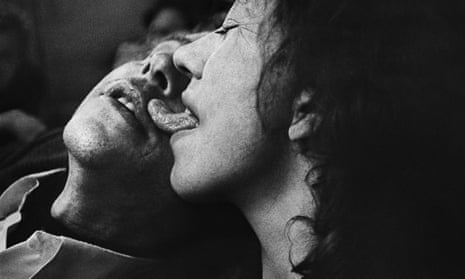“Lehmitz was the first thing I did seriously. It filled me up,” says Anders Petersen. “I really identified with these people and their situation, this group who were outside society. I respected them. I felt very strongly about them.”
Petersen’s photographs of Cafe Lehmitz and its customers – regulars in a Hamburg red-light-district dive at the fag end of the 60s – have long been among the most revered of photobooks. First published in 1978, Cafe Lehmitz became part of pop culture when Tom Waits used one as the cover of his 1985 Rain Dogs album.
Almost five decades after the photos were shot, the Swedish photographer, now 72, has revised his Lehmitz archive for an exhibition in Paris of previously unseen images.
The pictures were taken over three years in the late 1960s. Petersen had first visited the St Pauli district and its infamous Reeperbahn as a teenager studying German in 1962. He got to know some of the locals and forged friendships. Five years later Petersen, by then in his 20s and a photography student in Stockholm, could not resist the pull of St Pauli. “I went back there to find my friends and take pictures of their lives,” he says. “But people told me they were almost all dead.”

Shocked and disorientated, he ended up in a bar where he ran into one former friend, Gertrud. She was initially reluctant to help him with his plan to photograph people in this rough neighbourhood, but “after three beers she changed her mind and said we could meet next evening at 1am at a place called Cafe Lehmitz”.
“So I was there at one o’clock exactly,” Petersen continues. “I found a seat on the corner of a table and I put my camera down.” Distracted by talking, drinking and dancing in the packed bar, at first he didn’t notice that his camera had been picked up by some drinkers who were tossing it around and taking pictures of each other.
“They threw the camera to me, I kept it, and started to shoot,” he says. “At that moment Gertrud came in, two hours late. ‘Look! It’s working!’ she said. ‘So stay here and take some more pictures.’” Petersen did, staying for a month in a downmarket hotel before returning to Stockholm. But he kept going back to Hamburg – and to Cafe Lehmitz – taking photos every few months for the next two and a half years.

“It was nice to see all of the pictures together again because it was like a family album,” says Petersen. “But it’s not really the photographs that matter so much for me. It’s more the people.”
The great depth of the Lehmitz work is revealed by the surprising strength of the previously unseen photographs and their subjects, the cafe’s regulars who lived on the fringes of society, many of whom worked in Hamburg’s nearby red-light district. Petersen tells some of their stories as he looks at the photos: “Uschi. She was a very nice woman, very kind, very generous. She was raped when she was 14, she said by her cousin, and they blamed her. So she went out and started to earn money in the way, you know, that is very common.”
He remembers others: Cuxhaven teenager Mona and her striptease dancer friend Roxy; Ramona, who was once Karl-Heinz; a diseased man in his underwear, showing off his muscles. “In another there is a woman – I don’t remember her name – together with a man in a big hat. He was being very hard and rude to her. It was a horrible and upsetting situation. I was asking myself, should I really publish this? But I also have to show this side of life at the cafe. Not only the romantic things.”
Going back to his Lehmitz contact sheets also reveals how he has developed and changed as a photographer. “I don’t have the same taste today.” The older Petersen not only edits his pictures differently, the way he takes his photographs has also altered. “Then I was very much concerned about the atmosphere, the milieu,” he says. “I was very influenced by Ed van der Elsken’s Love on the Left Bank. But now I’m more into what I think I’m connected to, what I can identify with. I’m more direct.”

This directness gives Petersen’s photographs a visceral intimacy, especially in his later work such as From Back Home (shot in the rural part of Sweden he comes from) and City Diary, a three-book tour de force of raw encounters with people in different countries (a fourth volume is in the works). This ability to connect with his often marginalised subjects burns through Petersen’s pictures, making them art that transcends language and culture.
But this universal appeal has its downside. “Right now, I travel too much,” says Petersen on a flying visit home to Stockholm after exhibition-related trips to France and Russia, and just hours before he leaves to supervise the hanging of a major retrospective in Germany. “I’m much more interested in shooting.”
“I’m interested in being close. I want my pictures to ask questions,” he says. “For me, it’s all about people, wherever you are. It doesn’t matter what kind of religion or tradition you belong to, or what kind of culture you have. When I go to Italy, or China, or Tokyo or Chile, wherever I go, it’s not a big problem to get close to people and have a good time, because they are relatives, all one big family.”
- Café Lehmitz Revisited is at Circulations in Paris until 22 December; Anders Petersen Retrospektive is at MARTa Herford, Germany, until 12 March.

Comments (…)
Sign in or create your Guardian account to join the discussion